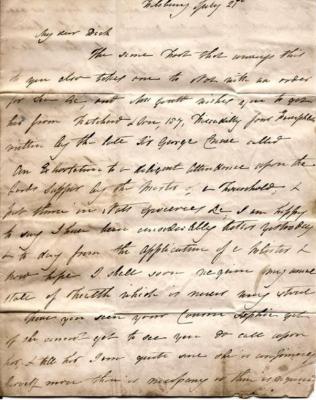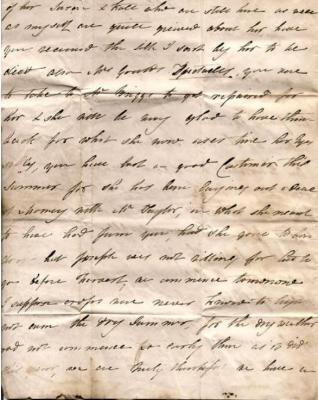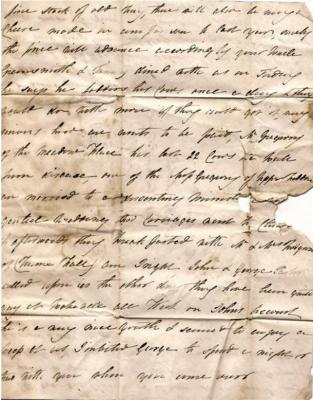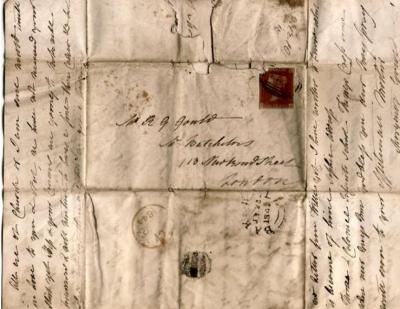
Nat Gould
His life and books
Pilsbury Grange Letter 10
Letter 10 of the Letters from Pilsbury Grange is dated 21 July 1844, and was written by Margaret Gould to her son Richard Goodwin Gould.




[[The address on the cover is:-]
Mr R G Gould
Mr Batchelors
113 New Bond Street
London
[[The letter is written as two sheets sealed in the old-fashioned way without an envelope. The cover sheet is stamped with a one penny imperforate red stamp, and has a Bakewell postmark dated 22 July 1844, and a London arrival backstamp in red dated 23 July 1844.]
[[First page]
Pilsbury July 21st 1844
My dear Dick
The same Post that conveys this to you also takes one to Nat with an order for tea &c & Mrs Gould wishes you to get her from Hatcherd & Son 157, Piccadilly four Pamphlets written by the late Sir George Crewe called An Exhortation to a diligent Attendance upon the Lords Supper by the Master of a Household, & put them in Nats Groceries &c, I am happy to say I have been considerably better yesterday & to day from the Application of a Blister & now hope I shall soon regain my usual state of Health which is never very sure[[?]
Have you seen your Cousin Sophia yet if she cannot get to see you do call upon her & tell her I am quite sure she is confining herself more than is necessary as there is [[?]
[[next page]
of her [[?] & [[?] who are still here as well as myself are quite greived about her, have you received the silk I sent by her to be died also & Mrs Goulds Spectacles you are to take to Mr Briggs to get repaired for her & she will be very glad to have them back for what she now uses tire her Eyes sadly, you have lost a good Customer this summer for she has been laying out a deal of Money with Mr Taylor in what she meant to have had from you had she gone to Lon-don – but Joseph was not willing for her to go before harvest we commence tomorrow I suppose crops were never knowne to [[?] over the dry summer, for the dry weather did not commence so early than as it did this year, we are Onely thankful we have a
[[next page]
fine stack of old hay, there will also be very [[little?] cheese made in comparison to last years onely the price will advance accordingly your Uncle Greensmith & Fanny dined with us on Friday he says he fodders his Cows once a day, & they would do with more if they could get it, very serious [[?] to be plied [[?], Mr Gregory of the Meadow Place has lost 22 Cows & a Bull from disease, - one of the Miss Gregory of Hope has be-en married to a dissenting Minister [[portion missing] genteel wedding the Carriages went to church & afterwards they breakfasted with Mr & Mrs Wildgoose of (Hume Hall) are [[?] John & George Taylor called upon us the other day they have been quite busy at Bakewell all week on Johns Account he is a very nice Youth & seems to enjoy a peep at us I invited George to spend a night or two with you when you come over
[[top of cover sheet]
All are at church or I am sure would wish[[?] their Love to you & Nat, we have not received your shirt yet Bess & your cousins are going to Bakewell tomorrow & will mention to Mary & Jane their Concern &c [[illegible portion]
[[bottom of cover sheet]
one letter from William yet, I have written to learn what is become of him – Sophia address Home & Colonial Infants School Kings Cross some where near Greys Inn God keep you dear Boy pray write soon to your affectionate Mother
Margaret Gould
This letter is particularly informative about life at Pilsbury Grange in the 1840s. Margaret Gould is still concerned about her sons. The letter establishes that Richard Goodwin Gouldwas in the fabric trade and Nathaniel in the tea trade. She appreciates that they can be so busy with work as not to be able to write to her as often as she might wish, but she is particularly troubled by the silence of her son William Gould 1819-1876.
Mrs Gould and her husband Joseph were neighbours at Pilsbury Lower House. Joseph Gould had inherited the tenancy there on the death of his childless uncle (also called Joseph Gould) in 1825. He was the grandson of William Gould 1739-1795 the diarist. During his tenancy Pilsbury Lower House was to pass out of Gould hands.
Mrs Gould was becoming understandably anxious about her spectacles. She would certainly need them to be able to study the religious pamphlets by Sir George Crewe she wished to order from Hatchards in Piccadilly. An Exhortation to a Diligent Attendance upon the Lord's Supper does not sound like light bedtime reading. Sir George Crewe of Calke Abbey was a particularly pious benefactor of his tenants, rebuilding churches at Grindon and Butterton and aiding village schools. He wrote other pamphlets, including A Word for the Poor, and against the present Poor Law, both as to its principle and practice, again hardly a best seller, although a copy did find its way into the National Library of Australia. Hatchards bookshop is still very much in business in London.
Less cheese was being made at Pilsbury Grange in 1844 than in other years because the grass had not grown well in that dry season they were then experiencing, and so the milk yield from their cows would be diminished.
As regards the Gregory family, Meadow Place is a farm on the southern bank of the River Lathkill near Youlgreave. Like Pilsbury it had once been a grange of the medieval monks, and was similarly owned by the Duke of Devonshire. Meadow Place was often tenanted by dissenters down the centuries.
Uncle Greensmith was Thomas Greensmith 1785-1876. He had married Thomasin Goodwin Gould 1787-1853, the sister of Margaret Gould's late husband Edmund Gould 1782-1833. Bess was Margaret Gould’s daughter Elizabeth Ann Gould 1827-1868, and Mary was her daughter Mary Gould 1826-1873. The identity of Jane is unknown.
"Cousin Sophia" was apparently not Sophia Tomkinson, daughter of Ellen Tomkinson née Peake the sister of Margaret Gould. Instead she seems to have been Sophia Sarah Stothard, because of the mention of the Home and Colonial School in London in this letter. Her relationship to the Peake and Gould families is unknown, and she may just have been a friend of Margaret Gould.
The connection of the Taylor family with the Goulds is unknown. So is the nature of the high jinks in Bakewell on account of John. If he was John Gilbert mentioned in other letters, perhaps he had got married. He was a bachelor in 1841 but married with two sons by 1851.
